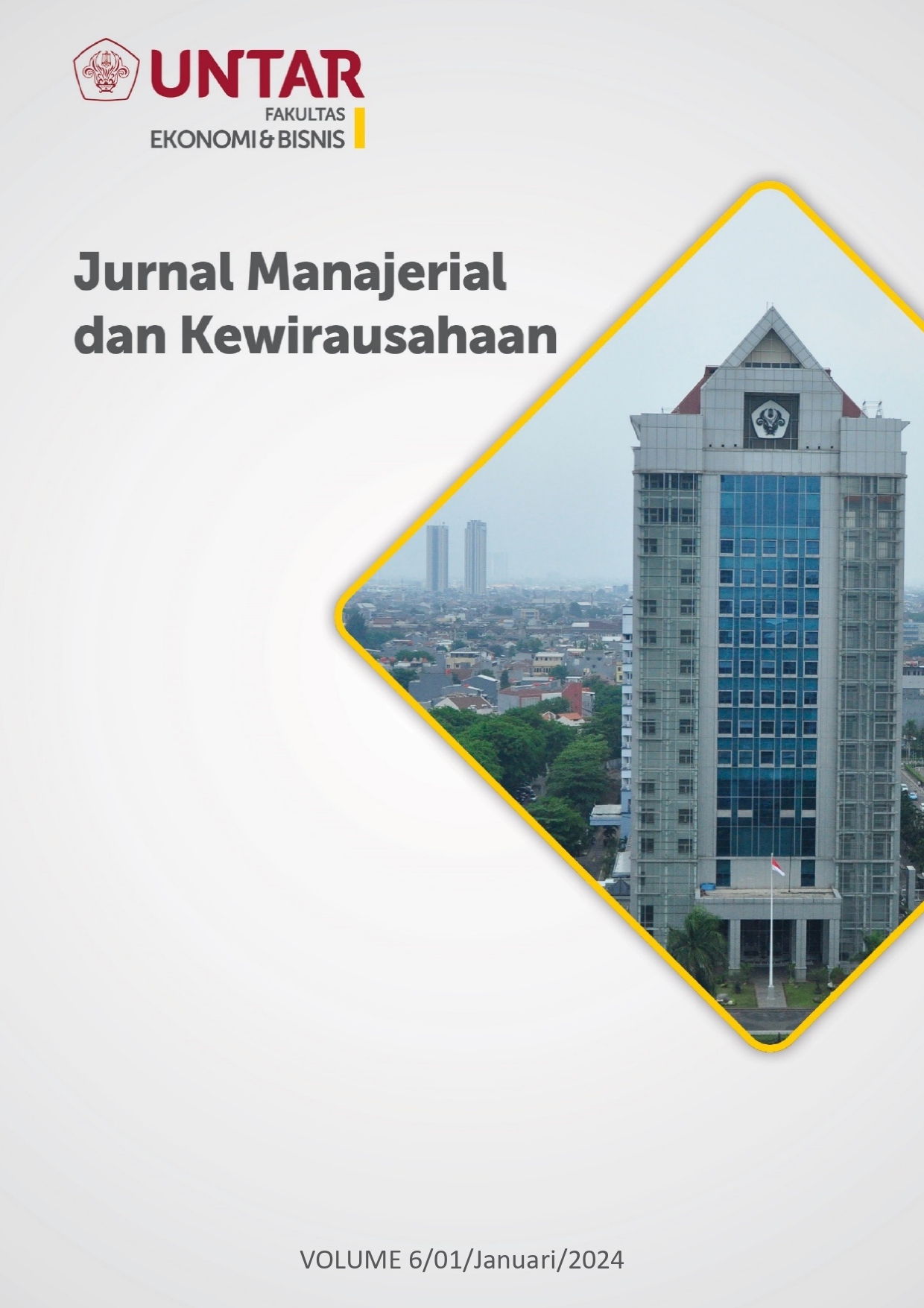Faktor-Faktor yang Mempengaruhi Kinerja Karyawan pada Perusahaan Creative Agency di Jakarta Barat
Main Article Content
Abstract
Sumber daya manusia merupakan aspek krusial yang harus diperhatikan oleh perusahaan karena kinerja perusahaan yang optimal bergantung pada prestasi karyawan. Faktor-faktor seperti lingkungan kerja, kompensasi, karakter individu, dan motivasi diidentifikasi sebagai elemen penting yang mempengaruhi kinerja karyawan dalam konteks perusahaan. Lingkungan kerja yang positif, pemberian kompensasi yang sesuai, karakter individu yang baik, dan motivasi yang tinggi dapat meningkatkan kinerja karyawan, dan sebaliknya. Penelitian ini empiris menguji hubungan antara lingkungan kerja, kompensasi, dan karakter individu terhadap kinerja karyawan, dengan motivasi sebagai variabel mediasi di Perusahaan XYZ di Jakarta Barat, berdasarkan model konseptual dual factor theory. Karyawan Perusahaan XYZ di Jakarta Barat menjadi populasi penelitian, dengan 195 responden sebagai sampel. Metode kuantitatif digunakan dengan pengumpulan data melalui teknik purposive sampling dan distribusi kuesioner via Google Form. Hasil penelitian menggunakan SmartPLS menunjukkan bahwa lingkungan kerja, karakter individu, dan motivasi berpengaruh positif dan signifikan terhadap kinerja karyawan. Sementara kompensasi tidak memiliki pengaruh signifikan terhadap kinerja karyawan. Selain itu, lingkungan kerja, kompensasi, dan karakter individu juga berpengaruh positif dan signifikan terhadap motivasi kerja, dan motivasi mampu memediasi pengaruh kompensasi terhadap kinerja karyawan.
Human resources are a crucial aspect that companies must pay attention to because the optimal performance of a company depends on the achievements of its employees. Factors such as the work environment, compensation, individual characteristics, and motivation are identified as essential elements influencing employee performance in a corporate context. A positive work environment, appropriate compensation, good individual characteristics, and high motivation can enhance employee performance, and vice versa. This empirical research examines the relationship between the work environment, compensation, and individual characteristics on employee performance, with motivation as a mediating variable at Company XYZ in West Jakarta, based on the conceptual dual factor theory model. The employees of the Creative Agency in West Jakarta serve as the research population, with 195 respondents as the sample. A quantitative method is employed, utilizing purposive sampling techniques and distributing questionnaires via Google Form for data collection. The research results, analyzed using smartPLS, indicate that the work environment, individual characteristics, and motivation have a positive and significant impact on employee performance. Meanwhile, compensation does not have a significant influence on employee performance. Additionally, the work environment, compensation, and individual characteristics also positively and significantly affect work motivation, and motivation can mediate the influence of compensation on employee performance.
Article Details
Section

This work is licensed under a Creative Commons Attribution-NonCommercial-ShareAlike 4.0 International License.
This work is licensed under a Jurnal Muara Ilmu Ekonomi dan Bisnis Creative Commons Attribution-ShareAlike 4.0 International License.,/p>
References
Anasi, S. N. (2020). Perceived Influence of Work Relationship, Work Load and Physical Work Environment on Job Satisfaction of Librarians in South-West, Nigeria. Global Knowledge, Memory and Communication, 69(6–7), 377–398. https://doi.org/10.1108/GKMC-11-2019-0135.
Angelika, S., & Yanuar. (2019). Pengaruh Gaya Kepemimpinan Transformasional, Budaya Organisasi, Kepuasan Kerja, dan Motivasi terhadap Kinerja Karyawan PT. Vizta Irama Sukses di Jambi. Jurnal Manajerial Dan Kewirausahaan, 1(3), 541–547. https://doi.org/10.24912/jmk.v1i3.5366
Eliyana, A., Ma’arif, S., & Muzakki. (2019). Job Satisfaction and Organizational Commitment Effect in the Transformational Leadership Towards Employee Performance. European Research on Management and Business Economics, 25(3), 144–150. https://doi.org/10.1016/j.iedeen.2019.05.001
Grobelna, A. (2019). Effects of Individual and Job Characteristics on Hotel Contact Employees’ Work Engagement and their Performance Outcomes: A Case Study from Poland. International Journal of Contemporary Hospitality Management, 31(1), 349–369. https://doi.org/10.1108/IJCHM-08-2017-0501
Hanafi, A. (2016). Influence of Individual Characteristic and Organization Climate on Job Satisfaction and Its Impact on Employee Performance. Sains Humanika, 8(4). https://doi.org/10.11113/sh.v8n4.843
Herzberg, F., Smith, P. C., Mausner, B., & Snyderman, B. B. (1959). The Motivation to Work. The American Journal of Psychology, 73(3), 501. https://doi.org/10.2307/1420202
Pawirosumarto, S., Sarjana, P. K., & Gunawan, R. (2017). The Effect of Work Environment, Leadership Style, and Organizational Culture Towards Job Satisfaction and Its Implication Towards Employee Performance in Parador Hotels and Resorts, Indonesia. International Journal of Law and Management, 59(6), 1337–1358. https://doi.org/10.1108/IJLMA-10-2016-0085
Riyanto, S., Endri, E., & Herlisha, N. (2021). Effect of Work Motivation and Job Satisfaction on Employee Performance: Mediating Role of Employee Engagement. In Problems and Perspectives in Management (Vol. 19, Issue 3, pp. 162–174). LLC CPC Business Perspectives. https://doi.org/10.21511/ppm.19(3).2021.14
Robbins, S. P., & Judge, T. A. (2008). Organizational Behavior.
Rojikinnor, R., Gani, A. J. A., Saleh, C., & Amin, F. (2023). The Role of Compensation As a Determinant of Performance and Employee Work Satisfaction: A Study at The PT Bank Rakyat Indonesia (Persero) Tbk. Journal of Economic and Administrative Sciences, 39(4), 943–956. https://doi.org/10.1108/jeas-06-2020-0103
Tanaka, M. (2021). Individual Perceptions of Group Work Environment, Motivation, and Achievement. IRAL - International Review of Applied Linguistics in Language Teaching. https://doi.org/10.1515/iral-2020.0183
Tarurhor, E. M. (2021). Mediation of Government Policies on Compensation Strategy and Employee Performance: A Structural Equation Model Approach. ABAC Journal, 41(2), 243–258.
Tumi, N. S., Hasan, A. N., & Khalid, J. (2022). Impact of Compensation, Job Enrichment and Enlargement, and Training on Employee Motivation. Business Perspectives and Research, 10(1), 121–139. https://doi.org/10.1177/2278533721995353
Yang, F. (2011). Work, Motivation and Personal Characteristics: An In-depth Study of Six Organizations in Ningbo. Chinese Management Studies, 5(3), 272–297. https://doi.org/10.1108/17506141111163363

